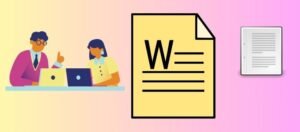When you’re applying for a job, you’re likely to come across the term “cover letter.” But what exactly is a cover letter, and why is it an essential part of the job application process?
A cover letter is a document you send alongside your resume or job application. It serves as an introduction to you as a potential employee and provides an opportunity to express your interest in a specific job.
While the resume provides a detailed summary of your work history, skills, and qualifications, the cover letter is your chance to add a personal touch to your application and explain why you are the ideal candidate for the position.
Let’s begin by exploring the core purposes of a cover letter.
The Core Purposes of a Cover Letter
1. Introduce yourself
One of the primary purposes of a cover letter is to introduce yourself to the employer. It serves as your initial interaction with the hiring manager, giving them a glimpse of who you are and what you bring to the table. You should briefly mention your name, contact information, and any relevant professional titles or certifications.
For example:
Dear Hiring Manager,
I am writing to express my strong interest in the XYZ position at ABC Company. My name is [Your Name], and I have [number of years] years of experience in the field of marketing and brand management.
2. Explain your interest
A well-crafted cover letter allows you to explain why you are interested in the job and the company. This is your opportunity to demonstrate that you have done your research and are genuinely enthusiastic about the role.
You can mention what attracted you to the position, such as the company’s values, mission, or the specific responsibilities of the job. Tailor your explanation to align with the company’s culture and goals.
For example:
I was drawn to ABC Company because of its reputation for innovative marketing strategies and commitment to promoting sustainable products. Your company’s mission aligns perfectly with my passion for creating meaningful connections with customers through strategic marketing initiatives.
3. Showcase your qualifications
Your cover letter serves as a platform to highlight your qualifications and skills that are relevant to the job you’re applying for. Use this opportunity to provide examples of how your experiences align with the job requirements.
Be specific in showcasing your accomplishments and contributions in previous roles. This demonstrates to the employer that you are a strong fit for the position and can immediately contribute to their team’s success.
For example:
In my previous role as a Senior Marketing Specialist at XYZ Agency, I led a team that successfully increased brand visibility and customer engagement by 30% within six months. This accomplishment demonstrates my ability to drive results through strategic marketing campaigns.
4. Personalize your application
Unlike a resume, which typically follows a standard format, a cover letter allows you to personalize your application to a specific job and company. Personalization is crucial because it shows that you’ve put thought and effort into your application.
Address the hiring manager by name if possible, and mention the job title and company name. Tailor your content to match the job description and emphasize how your skills and experiences align with the requirements.
For example:
Dear [Hiring Manager’s Name],
I am excited to apply for the position of Marketing Manager at ABC Company, as advertised on [Job Board]. With my extensive experience in marketing strategy development and my passion for driving brand growth, I am confident that I would be a valuable asset to your team.
5. Demonstrate your communication skills
Writing a well-structured and error-free cover letter showcases your communication skills. Employers often value strong communication abilities, as they are essential in most jobs. Your cover letter should be clear, concise, and free of grammatical and spelling errors.
Ensure that your writing style is professional and respectful. Avoid jargon or overly casual language, as the cover letter is a formal document.
For example:
I am writing to express my interest in the Marketing Manager position at ABC Company. My background in marketing, combined with my passion for innovative strategies, makes me an ideal candidate for this role.
6. Express enthusiasm
A cover letter allows you to express your enthusiasm for the job and the company. Showing your passion and excitement can set you apart from other candidates who may not convey the same level of interest.
Employers appreciate candidates who are genuinely excited about the opportunity and are motivated to contribute to the company’s success. Use positive language to convey your enthusiasm.
For example:
I am thrilled at the prospect of joining ABC Company and contributing to its continued growth. Your commitment to excellence and innovative marketing solutions aligns perfectly with my career goals.
7. Address gaps or concerns
If you have gaps in your employment history, changing careers, or other concerns that need addressing, a cover letter is a place to briefly explain these issues. It’s essential to provide context and reassure the employer.
Address any potential red flags directly but briefly, focusing on how you’ve overcome challenges or how your unique experiences have prepared you for the role.
For example:
During the past year, I took time off from my career to care for a family member who was facing health issues. This experience taught me valuable skills in time management, problem-solving, and resilience, which I believe will benefit me in the Marketing Manager role at ABC Company.
8. Request an interview
Towards the end of your cover letter, it’s common to express your eagerness to further discuss your qualifications in an interview. This encourages the employer to take the next step in the hiring process.
Be proactive and make it clear that you are available for an interview at their convenience. Include your contact information and express your desire to meet in person or through a virtual interview.
For example:
I would welcome the opportunity to discuss how my skills and experiences align with the needs of ABC Company. Please feel free to contact me at [your phone number] or [your email address] to schedule an interview at your earliest convenience.
Summary
In summary, a cover letter is a vital component of your job application that serves multiple purposes.
It introduces you to the employer, explains your interest in the job and company, showcases your qualifications, and provides an opportunity to personalize your application.
A well-crafted cover letter can set you apart from other candidates and increase your chances of landing an interview.
Please feel free to explore our services for professionally crafted CVs, cover letters, and LinkedIn makeover services.




